The world of Matrix, both as depicted in the movies and as an extended concept, raises several interesting ethical questions that have been debated by philosophers, scientists, and fans alike. At its core, the Matrix is a virtual reality system created to keep humanity under control while using their bodies for energy. This brings up numerous moral dilemmas related to consent, freedom of choice, and the nature of existence itself.
One major ethical consideration in the world of Matrix revolves around the concept of informed consent. The humans living within the Matrix are unaware that they are actually trapped in a simulated reality. They believe their lives and experiences to be real when, in fact, everything is an illusion created by machines for their own benefit. This raises questions about whether these individuals have truly given their consent to live in this artificial world or if they would choose differently once informed of the truth.
Another important ethical issue arises from the treatment of sentient beings within the Matrix. The programs and agents who inhabit the virtual reality are capable of thought, emotion, and self-awareness. Yet, many characters treat these entities as mere tools or disposable assets without considering their rights and feelings. This raises questions about how we should treat artificial intelligence in our own world and whether there is a difference between human-created AI and naturally occurring life forms.
In conclusion, the Matrix presents us with several complex ethical considerations that challenge our understanding of consent, autonomy, and sentience. As technology continues to advance and blur the lines between reality and simulation, these questions become increasingly relevant in shaping our society's values and moral compass.
